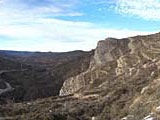Aurélie Bonin PhD thesis
 Relations between climatic changes, carbon cycle perturbations and carbonate production crises : the Early Cretaceous study
Relations between climatic changes, carbon cycle perturbations and carbonate production crises : the Early Cretaceous study
Defended on the 14th June 2011
Funding: FABER regional grant
Supervisors: Emmanuelle Vennin, Emmanuelle Pucéat and Emmanuella Matiolli
Started in October 2007
Abstract
Early Cretaceous is punctuated by carbon cycle perturbations, associated with organic matter burial episodes and carbonate production crises. These events coincide with short-term cooling > 1 Ma) which mechanisms are still unclear because of low resolution in sea surface temperature reconstructions. Recent climatic model suggests that platform collapse could trigger short term cool episode (Donnadieu et al., accepted). In order to establish relations between climate and carbonate production, we realize stratigraphic, palaeoecologic and geochemical studies on Valanginian sediments from the La Charce-Vergol and the Ollioules sections (South-eastern France) and on Aptian sedimentary record of the Galcé subasin (North-eastern Spain). This framework attempt to reconstruct high resolution temperature fluctuation in regard with pelagic and neritic carbonate producer evolution.
Both Valanginian and Aptian stages record polyphased neritic production drawdown. Some platform demise predate cooling event dated from the Late Valanginian, the earliest and from the latest Early Aptian. This chronology supposes that carbonate production decrease could impact the atmospheric CO2 pool and the climate. Nevertheless, cooling from the Late Valanginian and from the latest Early Aptian are also predated by continental and oceanic organic matter burial respectively. This process is also supposed to generate a CO2 drawdown and a cooling.
This study allowed to establish climate feedbacks on the pelagic and neritic carbonate producers triggering fluctuations in the carbonate production fluxes. Cooler conditions during the Late Valanginien and the latest Early Aptian are postdated by floro-faunal replacments caracterized by heterozoan to photozoan replacments. These suggest trophic level decrease relative to cool and dryer climatic conditions. Morever, nannoconid communities would record a response to the Late Valanginian climatic change : these producers are marked by a decline from the latest Early Valanginian interrupted by a recovery from the earliest Late Valanginian to the mid-Late Valanginian. This recovery coincides with cooling and dryer condition development trigerring low trophic level and promoting a subsequent pelagic production recovery.
Keywords
Valanginian, Aptian, carbonate platform demise, short term cooling, climate-carbonate production interaction
Jury
Thierry Adatte (université de Lausanne)
François Baudin (université de Paris VI)
Jean-François Deconinck (université de Bourgogne)
Emanuela Mattioli (université de Lyon I), supervisor
Bernard Pittet (université de Lyon I)
Emmanuelle Pucéat (université de Bourgogne), supervisor
Cécile Robin (université de Rennes 1)
Emmanuelle Vennin (université de Bourgogne), supervisor
Aurélien Virgone (Total)
- extrait:
- lien_externe:
- kc_data:
- a:8:{i:0;s:0:"";s:4:"mode";s:0:"";s:3:"css";s:0:"";s:9:"max_width";s:0:"";s:7:"classes";s:0:"";s:9:"thumbnail";s:0:"";s:9:"collapsed";s:0:"";s:9:"optimized";s:0:"";}
- kc_raw_content:
 Relations between climatic changes, carbon cycle perturbations and carbonate production crises : the Early Cretaceous study
Relations between climatic changes, carbon cycle perturbations and carbonate production crises : the Early Cretaceous studyDefended on the 14th June 2011
Funding: FABER regional grant
Supervisors: Emmanuelle Vennin, Emmanuelle Pucéat and Emmanuella Matiolli
Started in October 2007
Abstract
Early Cretaceous is punctuated by carbon cycle perturbations, associated with organic matter burial episodes and carbonate production crises. These events coincide with short-term cooling > 1 Ma) which mechanisms are still unclear because of low resolution in sea surface temperature reconstructions. Recent climatic model suggests that platform collapse could trigger short term cool episode (Donnadieu et al., accepted). In order to establish relations between climate and carbonate production, we realize stratigraphic, palaeoecologic and geochemical studies on Valanginian sediments from the La Charce-Vergol and the Ollioules sections (South-eastern France) and on Aptian sedimentary record of the Galcé subasin (North-eastern Spain). This framework attempt to reconstruct high resolution temperature fluctuation in regard with pelagic and neritic carbonate producer evolution.
Both Valanginian and Aptian stages record polyphased neritic production drawdown. Some platform demise predate cooling event dated from the Late Valanginian, the earliest and from the latest Early Aptian. This chronology supposes that carbonate production decrease could impact the atmospheric CO2 pool and the climate. Nevertheless, cooling from the Late Valanginian and from the latest Early Aptian are also predated by continental and oceanic organic matter burial respectively. This process is also supposed to generate a CO2 drawdown and a cooling.
This study allowed to establish climate feedbacks on the pelagic and neritic carbonate producers triggering fluctuations in the carbonate production fluxes. Cooler conditions during the Late Valanginien and the latest Early Aptian are postdated by floro-faunal replacments caracterized by heterozoan to photozoan replacments. These suggest trophic level decrease relative to cool and dryer climatic conditions. Morever, nannoconid communities would record a response to the Late Valanginian climatic change : these producers are marked by a decline from the latest Early Valanginian interrupted by a recovery from the earliest Late Valanginian to the mid-Late Valanginian. This recovery coincides with cooling and dryer condition development trigerring low trophic level and promoting a subsequent pelagic production recovery.Keywords
Valanginian, Aptian, carbonate platform demise, short term cooling, climate-carbonate production interaction
Jury
Thierry Adatte (université de Lausanne)
François Baudin (université de Paris VI)
Jean-François Deconinck (université de Bourgogne)
Emanuela Mattioli (université de Lyon I), supervisor
Bernard Pittet (université de Lyon I)
Emmanuelle Pucéat (université de Bourgogne), supervisor
Cécile Robin (université de Rennes 1)
Emmanuelle Vennin (université de Bourgogne), supervisor
Aurélien Virgone (Total)
